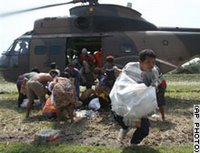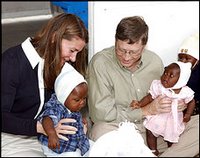 International relief officials said the crisis facing survivors of the latest Indonesian earthquake was beginning to ease, even as the death toll climbed to nearing 6000.
International relief officials said the crisis facing survivors of the latest Indonesian earthquake was beginning to ease, even as the death toll climbed to nearing 6000.Repairs to roads and airport runways speeded the arrival of food and other supplies Jan Egeland, the U.N's top humanitarian official, said the arrival of aid officials from 20 countries was helping alleviate problems. "I am getting reports that we are making enormous progress."
Officials estimated that 647,000 people have been displaced by the quake. Even as emergency air drops were underway, many survivors complained they had yet to receive adequate food, shelter or medical supplies.
Millions of dollars of aid has been pledged by the international community in the wake of the disaster. The United States increased its commitment to $5 million on Tuesday.
Egeland said the aid effort appeared to be going well overall, with improvements in coordination among aid organizations and nations since the 2004 tsunami that killed more than 131,000 people in Indonesia's Aceh province.
Saturday's earthquake is the worst disaster in Indonesia since the December 26, 2004, magnitude-9 earthquake that triggered a tsunami, killing at least 131,029 people in Indonesia alone. Another earthquake on March 28, 2005, killed about 900 people off the western coast of Sumatra.
CNN


